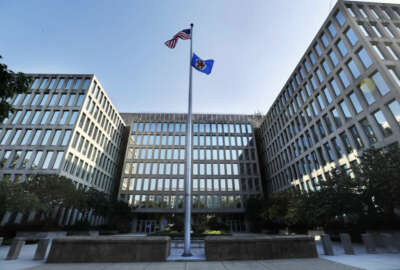OPM, AFGE test drive new governmentwide mentoring hub
The goal of the mentoring hub is to provide a one-stop shop and standardize, in many respects, how mentoring and knowledge sharing are done across the government.
wfedstaff | April 17, 2015 5:15 pm
Many agencies are missing out on capturing and sharing the knowledge of long-time federal employees before they retire.
The use of mentors and knowledge management is inconsistent at best across the government.
The Office of Personnel Management and the American Federation of Government Employees are teaming up to change the state of governmentwide mentoring and knowledge sharing. OPM and AFGE are speeding up progress on a year-long initiative to create a governmentwide mentoring hub.
The goal of the mentoring hub is to provide a one-stop shop and standardize in many respects how mentoring and knowledge sharing is done across the government, according to a presentation at the National Council on Federal Labor-Management Relations meeting Wednesday in Washington.
AFGE became aware of the mentoring hub and teamed with OPM to figure out how to improve and expand it.
“In this toolkit we could have several different types of models, strategies or concepts that would be beneficial to agencies that had a viable mentoring program or agencies that had no mentoring program,” said Linda Datcher, a workforce development manager at OPM, at the council meeting. “So we will run the gamut creating tools, best practices, events or anything that will create a mentoring culture, which is our overall goal.”
Aimed at all feds
OPM wants the governmentwide mentoring hub to increase collaboration and sharing, to share resources and lower costs for agencies, and improve succession planning across government.
The hub is aimed at all federal audiences, from new hires to current employees to retiring feds and interns.
Datcher said the initial effort kicked off in March 2012, and over the last 15 months they’ve developed a business case and are working toward pilots. So far, a working group made up of 14 agencies has come together to determine how to put the mentoring toolkit together, she said.
OPM launched the first pilot July 11 at Agriculture Department sites in New Mexico, Philadelphia and Washington D.C. A total of 100 people are participating in the group mentoring event for human resources and problem solving.
“The reviews so far have been pretty outstanding. For some people, it was kind of new to be in group mentoring,” she said. “But this group mentoring is a cohort, so it’s going to go from July to August with a webcast and then August to September to another group mentoring event. It’s all focused around problem solving.”
If I teach you to fish…
To start off, the mentors, most of who are senior federal officials, tried to understand the group’s knowledge of problem solving and offer their experiences.
“We made it very clear we didn’t want them to get into trying to solve people’s problems, but to mentor them through techniques in problem solving,” Datcher said. “If I teach you to fish, you’ll eat a long time, as opposed to just trying to solve the problem today.”
She said the mentees offered up problems to the group and the mentors helped with strategies to solve them.
The next session will be a fireside chat webcast to talk about problem solving in a more informal setting.
Datcher said the end goal is for employees to take all the nuggets from the mentoring sessions and determine whether they have made a difference. The initial effort also is trying to figure out if this type of mentoring closes competency and skill gaps among mentees.
OPM and AFGE have other pilots planned for the future, including a pilot to take off in early to mid October.
“We are looking at 100 pairs of mentoring relationships across government. The purpose of that is that we look at the federal government as one employer. It has so many facets that people want to know more about different things,” Datcher said. “While you can be a part of your mentoring program in your agency, you may have a desire to change career paths or have an interest in something else. This piece would allow you to have that.”
The third piece to the initiative is a training and orientation program.
“Agencies would be able to pick this up, use this to train their mentors and to better define the roles of the mentee,” Datcher said. “When I say train mentors, I mean in the way we would like to mentor in the federal government.”
A growing need for mentors
The need for a governmentwide mentoring hub comes from several angles.
First off, agencies are inconsistent in how they mentor employees and capture knowledge of long-time workers.
Second, succession planning, mentoring and knowledge sharing are becoming more important as more federal employees retire.
Since January, OPM has received more than 70,000 retirement claims. As more and more federal employees are leaving, agencies need to have a plan to replace this institutional knowledge. OPM said the governmentwide separation rate is 9 percent of employees each year, but 30 percent of that 9 percent is from retirement alone.
Additionally, employee turnover costs thousands of dollars to hire and train new workers, so anything that can be done to reduce that cost, especially in a time of tight budgets, is helpful, officials said.
Finally, the draft phased retirement regulations issued in June require exiting employees to spend at least 20 percent of their time mentoring their replacement.
“One of the real benefits of this type of approach fits in with something unions have been doing for quite some time internally in terms of trying to mentor and build up our leadership and trying to work with the idea of knowledge sharing,” said David Neun, an education specialist at AFGE. “We see this as something to support federal employees and try to expand out. It can help build a more inclusive, diverse environment to help troubleshoot issues when they come up in that area. We see that by being involved, we can, from a labor perspective, combining with our agency partners, really sort of work to create and expand the use of this program. Sometimes the best ideas are fantastic but they get limited and they get put up on a shelf and very few agencies are doing it. The intent behind this business case and the program we are trying to do is to expand that out.”
He added that by using the more than 700 labor management forums across the country, the mentoring hub can get a foothold in changing the culture, something OPM’s Datcher said is the goal of the governmentwide mentoring hub.
RELATED STORIES:
” target=”_blank”>CHCOs create speed dating for mentors, mentees
Copyright © 2024 Federal News Network. All rights reserved. This website is not intended for users located within the European Economic Area.
Jason Miller is executive editor of Federal News Network and directs news coverage on the people, policy and programs of the federal government.
Follow @jmillerWFED






